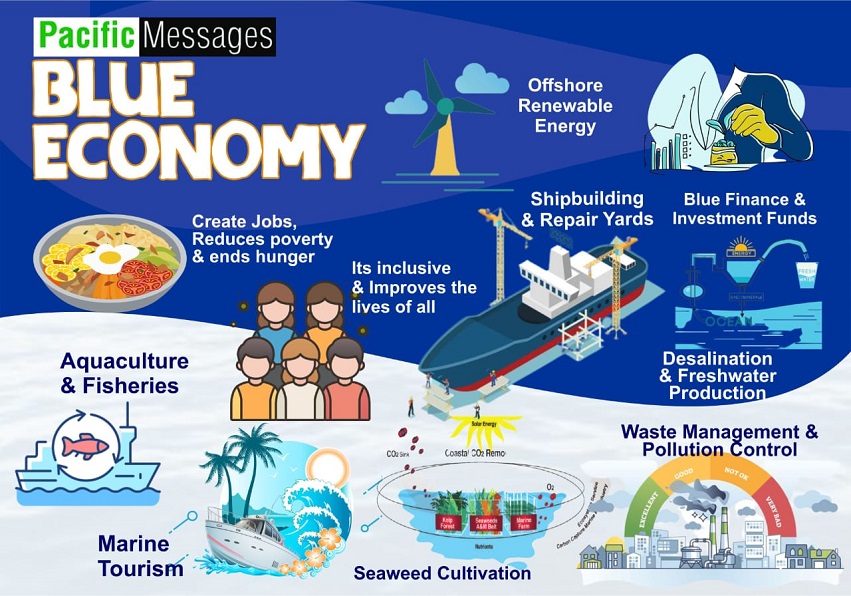By Moses Braimah
Baseline data collection is a fundamental step in assessing and managing the natural resources and ecosystems of marine and blue economy sectors. With the establishment of the Ministry of Marine & Blue Economy in Nigeria, there is a crucial opportunity to prioritize the collection, analysis, and effective management of data to drive economic growth and sustainable development. This espouse is to draw attention to the significance of baseline data, highlight critical data categories, discourse their utilization for economic and sustainable development, and proposes a department setup for managing this data.
The collection of baseline and other forms of existing data cannot be over emphasized. Some of their importance includes the following:
- Informed Decision-Making: Baseline data provides a foundation for informed policy and investment decisions, enabling evidence-based strategies for marine and blue economy sectors.
- Sustainability: Accurate baseline data helps monitor changes over time, ensuring resource management aligns with long-term sustainability goals.
- Risk Assessment: Baseline data aids in identifying vulnerabilities, risks, and opportunities for blue economy sectors, guiding effective risk mitigation.
- Investment Attraction: High-quality data enhances investor confidence, attracting private and public investments that align with sustainable practices.
So what are some these critical data categories that needs to be collected and collated, where they already exist:
- Ocean Health: Water quality, pollution levels, biodiversity, and ecosystem health indicators are essential for effective resource management and conservation.
- Economic Data: Data on fisheries, aquaculture, tourism, and maritime transport contribute to understanding sector contributions to GDP and potential growth.
- Climate and Weather: Meteorological and climate data support disaster preparedness and resilience in the face of climate change impacts.
- Spatial Data: Geospatial information aids in mapping resources, planning marine protected areas, and optimizing infrastructure development.
- Biodiversity: Collect data on marine species, habitats, and ecosystems to understand biodiversity and inform conservation efforts.
- Oceanographic Data: Gather information on temperature, salinity, currents, and nutrient levels to comprehend marine processes and trends.
- Environmental Data: Document pollution levels, plastic waste, and other environmental stressors to devise effective pollution control and sustainable management plans.
These data can be utilized for economic and sustainable development in the following ways:
- Resource Allocation: Precise data aids in allocating resources efficiently, reducing waste, and maximizing returns on investments.
- Regulatory Frameworks: Informed policies and regulations create a conducive environment for sustainable development and blue economy growth.
- Ecosystem Services Valuation: Data supports valuation of ecosystem services, facilitating sustainable blue economy practices.
- Strategic Planning: Data-driven insights inform long-term strategies, such as infrastructure development, tourism promotion, and waste management.
It is also vital to highlight the importance of data storage and management. This is so because they form a very critical aspect of this process. Data should be stored in a secure, accessible, and scalable digital platform, adhering to international data management standards. Cloud-based solutions can ensure data integrity, availability, and easy sharing among stakeholders. Effective data storage and governance methods are essential for maximizing the utility of collected information, ensuring its accuracy, security, and accessibility. Proper data management enables informed decision-making, policy formulation, and strategic planning, fostering a foundation of transparency and reliability crucial for sustainable development in the marine and blue economy sectors. Open data principles should be embraced to facilitate collaboration and transparency among stakeholders.
One of the key success factors for data collection and management is by having a proper structure that oversees, manage, and take primary responsibility for its failure and success. Therefore, it is recommended to have a dedicated department within the Ministry of Marine & Blue Economy.
The department role and responsibilities should include things like; data collection, analysis, storage, sharing, security, governance, periodic reporting to guide decision-making, etc. This data management should be made up of personnel with different expertise. A multidisciplinary team of marine scientists, economists, data analysts, and IT professionals should be put in place. They should be those who also understand the value of collaboration. They should collaborate with universities, research institutions, private sector, and international organizations for data exchange and capacity building.
In conclusion, baseline and other existing data collection / collation are paramount for the successful establishment and growth of the Nigeria Ministry of Marine & Blue Economy. By prioritizing the collection, analysis, and management of critical data categories, Nigeria can effectively drive economic growth, promote sustainable development, and enhance the resilience of marine and blue economy sectors. The proposed department setup will play a pivotal role in ensuring the availability and utilization of high-quality data to inform policy, investment, and decision-making processes.
Braimah is an Executive Project Director at PacificMessages

























































